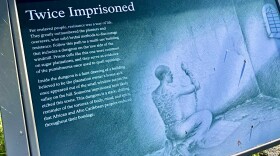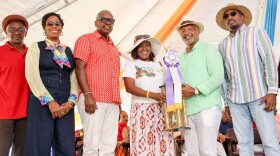ST. CROIX — The Territorial Committee of the Democratic Party of the Virgin Islands voted 19 to 0 during its quarterly meeting held virtually today that a recent District Court ruling finding provisions of the Virgin Islands Code unconstitutional relating to elections laws still requires the government to conduct a primary election, but it is now up to the Democratic Party to certify its candidates.
In addition to responding to Chief Judge Robert Molloy’s January 10 judgment that 10 provisions in the Virgin Islands Code relating to elections are unconstitutional, the Territorial Committee discussed the delegate selection caucus it will hold territory wide in June ahead of the Democratic National Convention set for August in Chicago.
Democratic State Chair Stedmann Hodge Jr. said he called for an emergency meeting that was held February 10 to address numerous issues, including Molloy’s opinion in the civil lawsuit the Republican National Committee and Republican Party in the Virgin Islands filed in August 2022 against the Virgin Islands Board of Elections and Supervisor of Elections Caroline Fawkes.
During the emergency meeting, Hodge said an Ad Hoc Committee was created to review the court’s ruling. He said the Ad Hoc Committee met on March 13 to conduct its review. The members of the Territorial Committee heard the report from the Ad Hoc Committee during today’s meeting before voting to approve its recommendations.
Primary election:
The discussion about the District Court’s ruling focused on Title 18 of the VI Code, Section 232, which includes two sentences. The first sentence, which remains law, requires that party primary elections be held on the first Saturday in August for the purpose of choosing candidates for nomination to public offices to be voted for at the ensuing general election. The second sentence that gave the Board of Elections responsibility for certifying the process to be used by any political party to select party officers and candidates for public office was deemed unconstitutional.
The Democratic Party’s Territorial Committee approved a motion to accept a recommendation from the party’s Ad Hoc Committee. Since the first sentence of Section 232 remains law, the approved recommendation was that the Board of Elections is still required to conduct a primary election on the first Saturday in August and pay for it, but that now it is up to the Democratic Party to create a process that certifies its candidates for public office and party officials.
Another approved recommendation was that the party would write a letter to the Board of Elections and the supervisor of elections explaining its position.
Since the District Court’s ruling allows political parties to conduct their own primaries, Fawkes told senators during a Committee of the Whole meeting Monday that the Office of the Supervisor of Elections would not be able to conduct primary elections given the court’s ruling unless amendments are made to the laws that are deemed unconstitutional.
READ MORE: “ESVI: Government unable to conduct primary elections without changes to unconstitutional laws”
Ashley Scotland, Ad Hoc Committee chair, read a portion of the letter the Democratic Party will present to the Board of Elections and Fawkes in response to an inquiry from WTJX at the conclusion of the virtual meeting regarding the elections supervisor’s statement that amendments would be required for her office to conduct primaries.
“Generally, as relevant here, the opinion holds that the Board of Elections cannot certify the election results of private political parties, party officials and its public offices because ‘it is unconstitutionally vague,’ and consequently, the court finds that this second sentence of Section 232 is unconstitutional to the extent it allows the Board of Elections to reject a political party’s process used in selecting its officers and candidates for office,” Scotland read. “It is important to note what the case does not say. It does not say that the Board of Elections cannot conduct the primary elections of party officials or public officials. It just cannot certify or reject the process or results.”
When asked about the fact that the first sentence of Section 232 only states that party primary elections be held on the first Saturday in August but that it doesn’t indicate which entity must conduct the primaries, Scotland said prior court cases have resulted in rulings that the Board of Elections is the entity that conducts primaries.
In response to a question from the Virgin Islands Consortium regarding the intent of the Democratic Party’s letter that will be sent to the election officials, Scotland said nothing has changed because of the District Court’s ruling when it comes to the ability for the government to conduct primaries.
“Nothing in the judge’s ruling has changed the ability to conduct the election,” he said, clarifying the only difference is the ability of the Board of Elections to certify the results.
Scotland pointed out that Fawkes is the only election official to give an opinion on the court’s ruling, noting there has not been any legal opinion and the Board of Elections has not weighed in on the matter.
WTJX reached out to members of the Board of Elections after the meeting to discuss their position on whether the board can conduct a primary given the court’s ruling.
Arturo Watlington, a Board of Elections member, said he didn’t have an opinion.
“That’s up to the Legislature,” he said. “The Board of Elections is only a creature of the Legislature.”
Watlington said he understands why the government has historically been involved in conducting primaries. He said, however, it is time for the political parties to control the way they nominate people for party offices as well as public offices. In most jurisdictions, he said the primary election is held by the government for positions of public office, while the political parties determine how they want to elect party offices.
“Our problem is that the party offices and the public offices are merged in our law, so that creates a problem,” Watlington said.
Harriet Mercer, a Board of Elections member, said the government should not pay for a primary election.
“Nobody in this government should pay for a primary,” she said, adding that there is now a court order calling for the parties to pay for their primaries. “The people cannot pay for that anymore.”
Mercer said nothing in the law indicates which entity pays for a primary election but noted that logic suggests the political party would pay for it. She said the law only stated the Board of Elections must certify the results, clarifying the District Court’s ruling now prevents the board from doing that.
“The parties need to hold their own primary, present the results to the System, and we move from there,” she said, referring to the Elections System of the Virgin Islands.
Epiphane Joseph, a Board of Elections member, pointed out that party offices and public offices are not the same. He said the political parties should be responsible for electing their own party leaders.
“I don’t think that the public is supposed to finance the primary for any party,” he said.
Democratic Party caucus:
The Democratic Party of the Virgin Islands will hold its caucus on June 8, with early voting set for June 6 and 7. One voting location per island is expected to be announced Monday.
Members of the Democratic Party will have an opportunity during the caucus to select the delegates who will represent the party at the Democratic National Convention scheduled from August 19 to 22 at the United Center in Chicago. They will also select whether they want President Joe Biden to be the party’s nominee to run for re-election in November, or whether they are uncommitted.
“We are asking Democrats to come and participate and select who they want on each island district to represent the Democratic Party at the convention as delegates, and we’re also asking them to choose to select who they want to be the nominee for the Democratic Party for president of the United States,” Carol Burke, the Democratic Party’s vice chair and coordinator of the caucus, said.
Burke said none of the delegate candidates are uncommitted. Therefore, she said Democrats who choose uncommitted for the party’s presidential nominee will not be able to select any delegates.
“If you want to vote for the delegate side, you have to say you want a Biden ballot because everybody is committed to Joe Biden,” she said.
The Democratic Party recently received approval from the Democratic National Committee for the Virgin Islands Board of Elections to conduct a voter registration drive on the day of the caucus, Burke said. She stressed the need to get more people registered as Democrats following a decline in the territory’s population in the aftermath of Hurricanes Irma and Maria as well as the coronavirus pandemic. Only registered Democrats will be able to participate in the caucus and select delegates.
“We want our caucus to be a spirited caucus, and so we really encourage the candidates to bring it on,” Burke said.
The Democratic Party will send six automatic delegates to the Democratic National Convention, as well as seven elected delegates and one alternate. The six automatic delegates are Hodge, in his capacity as state chair, and Burke, in her capacity as vice chair, as well as National Committeeman At-Large Senator Angel Bolques Jr., National Committeewoman Donna Christensen, Delegate to Congress Stacey Plaskett and Governor Albert Bryan Jr.















